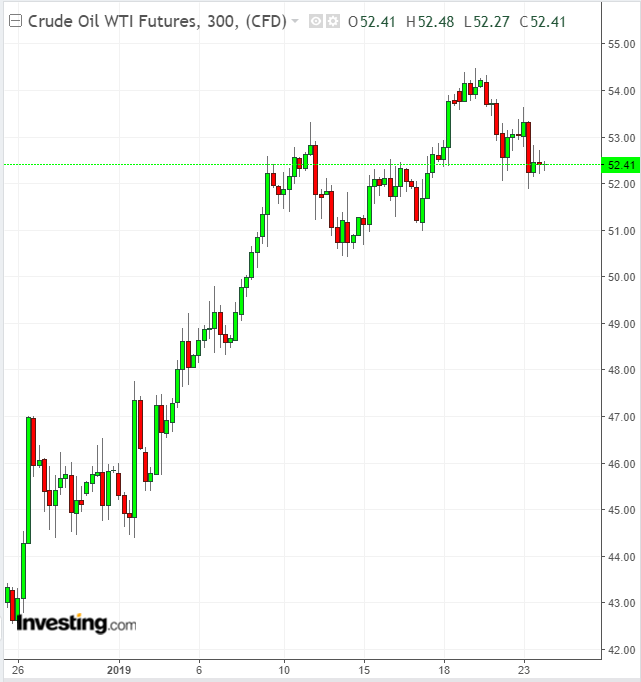The political crisis in Venezuela is escalating. Yesterday, the United States, Canada, Brazil and a slew of other South and Central American countries officially recognized Venezuelan opposition leader, Juan Guaido, as the interim president in place of Nicolas Maduro whose regime has driven the South American country to economic collapse.
Guaido had been the president of the Venezuelan National Assembly before ascending to this new, disputed role. In addition, the Trump administration is now openly considering placing sanctions on Venezuela’s oil exports.
The U.S. already has a variety of sanctions in place on Maduro and his supporters, but it has refrained from sanctioning Venezuela’s oil. This could change. President Trump says he is actively considering such sanctions amidst growing protests against Maduro’s increasingly authoritarian rule.

Last week, I touched on the potential impact of such sanctions on the Citgo refinery in the U.S. However, there are larger potential implications for for the price of oil and markets that sanctions on Venezuelan oil could cause.
Price of Heavy Sour Crude Could Jump
Venezuela has the largest oil reserves in the world. Easily recoverable oil was first discovered there in 1914 in Lake Maracaibo, but much of Venezuela’s current production comes from the much more expensive and difficult-to-exploit oil resources in the Orinoco Belt. Oil production from Venezuela has been as high at 3.4 million barrels per day, but declined to under 1.2 million barrels per day in 2018. Venezuela is the 3rd largest source of foreign oil for the United States (Canada and Saudi Arabia both export more oil to the U.S. than Venezuela). Slightly less than half of Venezuela’s current production is exported to refineries in the United States, one of which, Citgo, is owned by PdVSA.
The country's oil is primarily heavy sour crude which is often mixed with other types of oil for processing. If Venezuela is removed as a source of heavy sour crude, the price of this type of oil will go up. In fact, according to Reuters, the price of some similar grades of crude oil went up by $6.25 on Tuesday.
Venezuela's Imports of U.S. Petroleum Products Would Cease
Canada also produces similar crude, from its tar sands region in Alberta. However, the effected U.S. refineries, which are mainly located in the Gulf of Mexico region, would have difficulty getting that oil, because Alberta is facing significant transportation bottlenecks. Rerouting oil from the Middle East is not an ideal option, since that would take a significant amount of time.
Therefore, if these sanctions happen, the refineries in the Gulf of Mexico that use Venezuelan oil would face higher costs. If they have to run at less than full capacity, we could even see increases in gasoline prices in some places.
If the U.S. does sanction Venezuelan oil, it is likely that Venezuela will also halt its purchases of American petroleum products even though that decision would hurt Venezuela more than it would impact the U.S. According to the EIA, Venezuela imported over 3 million barrels of petroleum products from the U.S. during October 2018.
Venezuela’s refineries have been devastated and can no longer produce enough gasoline and other petroleum products to meet local needs. Since 2016, Venezuela has been importing diluents from the United States, petroleum products that are mixed with Venezuela’s heavy oil so that the oil can be exported. If trade with the United States breaks down entirely, Venezuela’s oil exports to other customers could drop off significantly until it finds another source of diluents.
Rosneft Might Seize PdVSA Assets in U.S.
The revenue Venezuela receives from the United States market is generally used to fund Venezuela’s budget. The rest of Venezuela’s oil sales go directly to finance interest payments on loans the country has taken from Russian and Chinese interests, among others.
Should Venezuela default on its payments to Russia’s Rosneft (MCX:ROSN), the Russian oil firm might move to seize Venezuelan oil assets in the U.S. In fact, 49.9% of Citgo is currently serving as collateral for PdVSA’s debts to Rosneft.
It is most likely that the U.S. government would block Rosneft’s acquisition of Citgo on national security grounds, but that could lead to a dispute and standoff between Venezuela, Russia and the U.S. If PdVSA defaults, and if the U.S. government forbids Rosneft from taking a stake in Citgo, we might see a sale of those shares to an mutually agreed-upon more neutral firm (likely at a discount).
Sanctions: Bad for Venezuela, Equally Bad for the U.S.
Clearly, sanctions would be very damaging for Venezuela. However, the immediate impact of sanctions would also be significant for the U.S. Right now the U.S. is flush with petroleum products. Refineries are running at full capacity and product inventories are building up in storage.
Mexico has halted imports from the U.S. while it sorts out theft problems along its pipeline infrastructure. If Venezuela also suspends all imports from the U.S. we could see larger builds of petroleum products.
Most analysts expect Venezuela’s oil production to decline to under 1 million barrels per day during 2019. However, if the process is accelerated by sanctions, then come May we could also see a sharp rise in oil prices.
The confluence of sanctions on Venezuela, the start of the driving season in the U.S., the end of some or all of the exemptions given to importers of Iranian oil and the OPEC+ production cuts could make for a much tighter oil market this spring.
